
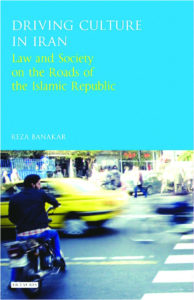
Driving Culture in Iran: Law and Society on the Roads of the Islamic Republic
Reza Banakar
I.B.Tauris (2015)
Reza Banakar is Professor and Director of Research in the Sociology of Law Department at Lund University. He has previously held the positions of Professor of Socio-Legal Studies at the Department of Advanced Legal Studies at the University of Westminster and Research Fellow at the Centre for Socio-Legal Studies at the University of Oxford. He is the author of Normativity in Legal Sociology (2015) and Law and Social Theory (2010, 2013).
Reza Banakar is Professor of Socio-Legal Studies at the Department for Advanced Legal Studies, School of Law, University of Westminster and the Director of Research at the Centre for Legal Sociology at Lund University.
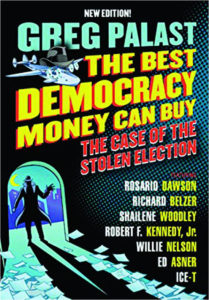
The Best Democracy Money Can Buy
Greg Palast
Penguin Publishing Group (2003)
“Palast is astonishing, he gets the real evidence no one else has the guts to dig up.” Vincent Bugliosi, author of None Dare Call it Treason and Helter Skelter
Award-winning investigative journalist Greg Palast digs deep to unearth the ugly facts that few reporters working anywhere in the world today have the courage or ability to cover. From East Timor to Waco, he has exposed some of the most egregious cases of political corruption, corporate fraud, and financial manipulation in the US and abroad. His uncanny investigative skills as well as his no-holds-barred style have made him an anathema among magnates on four continents and a living legend among his colleagues and his devoted readership.
This exciting collection, now revised and updated, brings together some of Palast’s most powerful writing of the past decade. Included here are his celebrated Washington Post exposé on Jeb Bush and Katherine Harris’s stealing of the presidential election in Florida, and recent stories on George W. Bush’s payoffs to corporate cronies, the payola behind Hillary Clinton, and the faux energy crisis. Also included in this volume are new and previously unpublished material, television transcripts, photographs, and letters.
Greg Palast’s writings have appeared in The Washington Post, Harper’s, and The Nation. He’s been a guest on Politically Incorrect, C-Span’s Washington Journal, and does regular investigative reports for BBC Nightline. Winner of Salon.com’s 2001 “Politics Story of the Year,” Greg Palast is a legend among his colleagues and his devoted readership worldwide. He divides his time between New York and London.
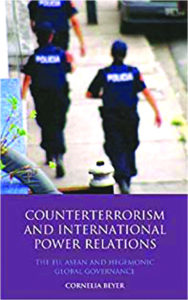
Counter Terrorism and International Power Relations: The EU, ASEAN and Hegemonic Global Governance
Cornelia Beyer, Anna Cornelia Beyer
Bloomsbury Academic (2010)
Why do states and international relations organizations participate in the “”global war on terrorism”“? This book asks this question within a broad framework, exploring the mechanisms and causes for participation in global governance and taking counterterrorism as a pertinent case. Challenging the assumption of egalitarian structures of global governance, the author argues that power relations and the use of power (influence, coercion and force) play a more important role than previously suggested. Providing a critical assessment of the counterterrorism policies of EU, US and ASEAN, the book identifies a number of causes of participation in hegemonic governance, including asymmetric interdependence with the US, open and informal pressure in the case of the EU, and the authority and legitimacy of the leading actors.
Anna Cornelia Beyer is Lecturer in Security Studies at the University of Hull, UK.
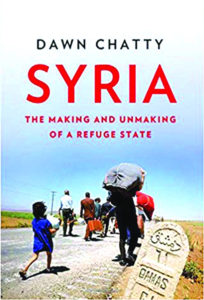
Syria: The Making and Unmaking of a Refuge State
Dawn Chatty
Hurst (2017)
The dispossession and forced migration of nearly 50 per cent of Syria’s population has produced the greatest refugee crisis since World War II. This new book places the current displacement within the context of the widespread migrations that have indelibly marked the region throughout the last 150 years. Syria itself has harboured millions from its neighbouring lands, and Syrian society has been shaped by these diasporas. Dawn Chatty explores how modern Syria came to be a refuge state, focusing first on the major forced migrations into Syria of Circassians, Armenians, Kurds, Palestinians, and Iraqis. Drawing heavily on individual narratives and stories of integration, adaptation, and compromise, she shows that a local cosmopolitanism came to be seen as intrinsic to Syrian society. She examines the current outflow of people from Syria to neighbouring states as individuals and families seek survival with dignity, arguing that though the future remains uncertain, the resilience and strength of Syrian society both displaced internally within Syria and externally across borders bodes well for successful return and reintegration. If there is any hope to be found in the Syrian civil war, it is in this history.
Dawn Chatty is Emeritus Professor of Anthropology and Forced Migration and former Director of the Refugee Studies Centre, Department of International Development, Oxford University and the author of Displacement and Dispossession in the Modern Middle East and From Camel to Truck.
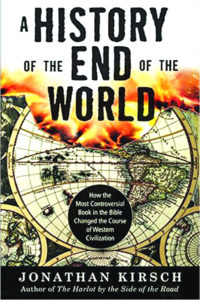
A History of the End of the World: How the Most Controversial Book in the Bible Changed the Course of Western Civilization
Jonathan Kirsch
HarperCollins (2007)
“[The Book of] Revelation has served as a “language arsenal” in a great many of the social, cultural, and political conflicts in Western history. Again and again, Revelation has stirred some dangerous men and women to act out their own private apocalypses. Above all, the moral calculus of Revelation—the demonization of one’s enemies, the sanctification of revenge taking, and the notion that history must end in catastrophe—can be detected in some of the worst atrocities and excesses of every age, including our own. For all of these reasons, the rest of us ignore the book of Revelation only at our impoverishment and, more to the point, at our own peril.”
The mysterious author of the Book of Revelation (or the Apocalypse, as the last book of the New Testament is also known) never considered that his sermon on the impending end times would last beyond his own life. In fact, he predicted that the destruction of the earth would be witnessed by his contemporaries. Yet Revelation not only outlived its creator; this vivid and violent revenge fantasy has played a significant role in the march of Western civilization.
Ever since Revelation was first preached as the revealed word of Jesus Christ, it has haunted and inspired hearers and readers alike. The mark of the beast, the Antichrist, 666, the Whore of Babylon, Armageddon, and the Four Horsemen of the Apocalypse are just a few of the images, phrases, and codes that have burned their way into the fabric of our culture. The questions raised go straight to the heart of the human fear of death and obsession with the afterlife. Will we, individually or collectively, ride off to glory, or will we drown in hellfire for all eternity? As those who best manipulate this dark vision learned, which side we fall on is often a matter of life or death. Honed into a weapon in the ongoing culture wars between states, religions, and citizenry, Revelation has significantly altered the course of history.
Kirsch, whom the Washington Post calls “a fine storyteller with a flair for rendering ancient tales relevant and appealing to modern audiences,” delivers a far-ranging, entertaining, and shocking history of this scandalous book, which was nearly cut from the New Testament. From the fall of the Roman Empire to the Black Death, the Inquisition to the Protestant Reformation, the New World to the rise of the Religious Right, this chronicle of the use and abuse of the Book of Revelation tells the tale of the unfolding of history and the hopes, fears, dreams, and nightmares of all humanity.
Jonathan Kirsch is the author of 10 books, including the national bestseller The Harlot by the Side of the Road and his most recent work, the Los Angeles Times bestseller A History of the End of the World. Kirsch is also a book columnist for the Los Angeles Times, a broadcaster for NPR affiliates in Southern California, and an adjunct professor at New York University.

